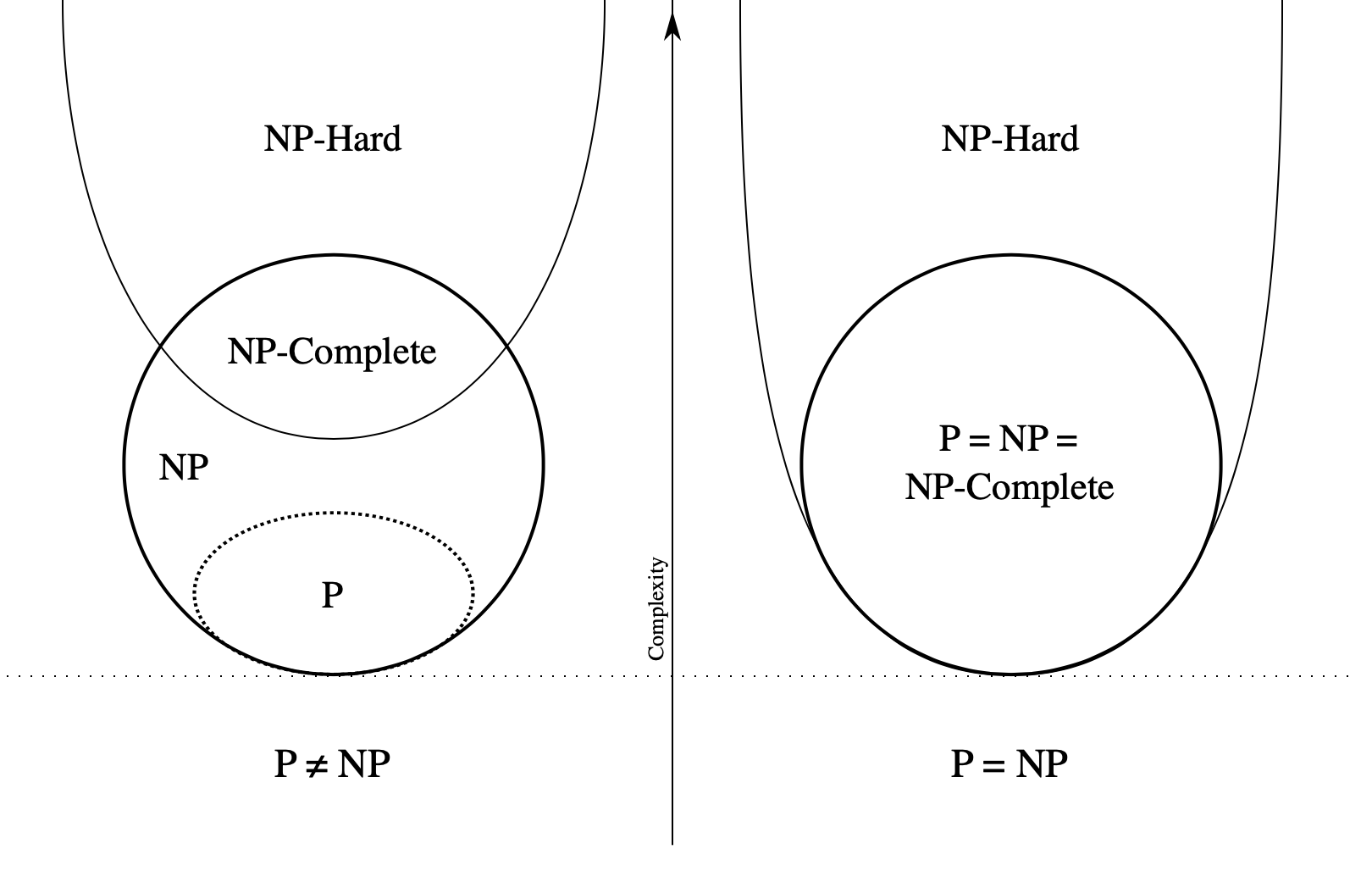P vs. NP vs. NP-complete vs. NP-hard
computer scienceThese definitions all refer to how long it takes for a program to run.
P
- Polynomial
- efficiently solvable,
- Problems that can be solved in polynomial time,
- polynomial time: time taken is of the form O(n^c)
- Decision problems that can be solved efficiently.
- Efficient algorithms:
- are algorithms that use at most polynomial amount of computer resources,
- are algorithms that have polynomial worst-case running time.
- Formally, a decision problem Q is in P if:
- there is an efficient algorithm A for all inputs x:
- if Q(x) = YES then A(x) = YES,
- if Q(x) = NO then A(x) = NO,
- there is an efficient algorithm A for all inputs x:
NP
- Non-deterministic polynomial,
- efficiently verifiable,
- Problems with efficient algorithms for verifying proofs/certificates/witnesses(sometime people use certificate or witness in place of proof),
- A program that solves a problem in non-deterministic polynomial(NP) time,
- not in polynomial time on a regular computer(deterministic Turing machine)
- BUT on polynomial time on a non-deterministic Turing machine
- a non-deterministic Turing machine can do everything a regular computer does and more
- Problems that cannot be solved, but verified in polynomial time,
- Class of problems which have efficient verifiers,
- Formally, a decision problem Q is in NP if:
- there is an efficient algorithm V called verifier for all inputs x:
- if Q(x) = YES then there is a proof y such that V(x, y) = YES,
- if Q(x) = NO then for all proofs y such that V(x, y) = NO,
- there is an efficient algorithm V called verifier for all inputs x:
- A decision problem is in NP if we can give an efficient verifier which is sound and complete:
- sound verifier: a verifier which does not accept any proof when the answer is NO,
- complete verifier: a verifier which accepts at least one proof when the answer is YES.
- REMARK: If any particular problem is said to be in NP and nothing else is said about it, then the fastest algorithm to solve this problem takes exponential time. But, it does not mean that there are better algorithms; it’s just that we do not know of that.
- REMARK: Stating that a problem is in NP space, does not mean that it’s hard to solve; it just means that it’s easy to verify, it’s an upper-bound on the difficulty of solving the problem.
- REMARK: Many NP problems are easy to solve since 𝖯⊆𝖭𝖯.
- If a reduction algorithm A works in polynomial time, then it’s called
polynomial time black box reductionorCook Reduction
NP-hard
- A problem X is NP-hard, if there’s an NP-complete problem Y such that Y can be reduced to X in polynomial time,
- A problem is NP-hard if it’s at least as hard as the hardest problem in NP-complete.
- If a problem satisfies the second condition of NP-completeness(the universal conditionality), then it’s NP-hard
- A way of saying that a problem is difficult
- NP-hardness = universality
- Therefore the name NP-universal would be a better name than NP-hard since it’s just that we don’t know if they’re easily solvable.
NP-complete
- A problem that is both NP-hard and NP.
- The most difficult problems in NP to solve
- If we can solve an NP-complete problem efficiently, we can solve all NP problems efficiently.
- Many natural NP problems turns out to be NP-complete
- natural problem: a problem which people really care about solving but not an artificial one just to prove a point
Overall Picture
Here is a nice picture to see a comparison of everything talked here.
